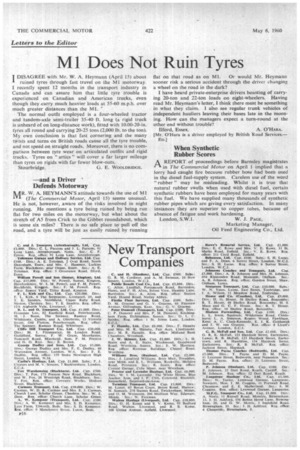Ml Does Not Ruin Tyres
Page 110

If you've noticed an error in this article please click here to report it so we can fix it.
I DISAGREE with Mr. W. A. Heymann (April 15) about I ruined tyres through fast travel on the MI motorway. I recently spent 12 months in the transport industry in Canada and can assure him that little tyre trouble is experienced on Canadian and American trucks, even though they-carry much heavier loads at 55-60 m.p.h. over much greater distances than the Ml.
The normal outfit employed is a four-wheeled tractor and tandem-axle semi-trailer 35-40 ft. long (a rigid truck is unheard of on long-distance work), fitted with 10.00-20-in. tyres all round and carrying 20-25 tons (2,000 lb. to the ton). My own conclusion is that fast cornering and the many twists and turns on British roads cause all the tyre trouble, and not speed on straight roads. Moreover, there is no comparison between tyre wear on articulated outfits and rigid trucks. Tyres on " artics " will cover a far larger mileage than tyres on rigids with far fewer blow-outs.
Stourbridge. G. E. WOOLDRIDGE.
—and a Driver Defends Motorway
iviR. W. A. HEYMANN'S attitude towards the use of MI Lvi. (The Commercial Motor, April 15) seems unusual. He is not, however, aware of the risks involved in night running. He mentions a tyre being ruined by being run flatfor two miles on the motorway, but what about the stretch of A5 from Crick to the Gibbet roundabout, which iS some six miles? There is no safe place to-pull oil the road, and a tyre will be just as easily ruined by running
flat on that road as on Ml. Or would Mr. Heymann sooner risk a serious accident through the driver changing a wheel on the road in the dark?
I have heard private-enterprise drivers boasting of carrying 20-ton and 22-ton loads on eight-wheelers. Having read Mr. Heyrnann's letter, I think there must be something in what they claim. I also see regular trunk vehicles of independent hauliers leaving their bases late in the morning. How can the managers expect a turn-round at the other end without trouble?
Ilford, Essex. A. O'HARA. [Mr. O'Hara is a driver employed by British Road Services.— ED.1
When Synthetic Rubber Scores
A REPORT of proceedings before Barnsley magistrates r-1 in The Commercial Motor on April 1 implied that a lorry had caught fire because rubber hose had been used in the diesel fuel-supply system. Careless use of the word "rubber" may be misleading. Whilst it is true that natural rubber swells when used with diesel fuel, certain synthetic rubbers have been employed for many years with this fuel. We have supplied many thousands of synthetic rubber pipes which are giving every satisfaction. In many instances they are superior to copper tubes, because of absence of fatigue and work hardening.
London, S.W.1. W. J. PAGE,
Marketing Manager, Oil Feed Engineering Co., Ltd.




































































































































































































































































